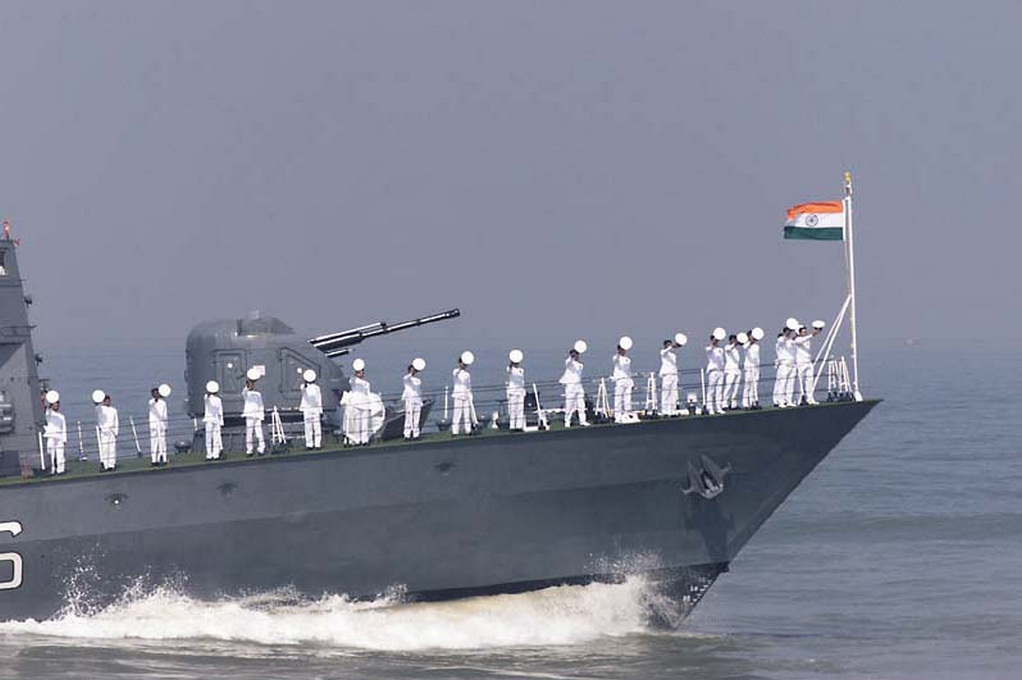Indian Navy (IN) has commissioned solar power with cumulative capacity of 15.87MW which is in line with the Navy’s objective of fulfilling Govt of India’s ‘Jawaharlal Nehru National Solar Mission (JNNSM)’ mission. These plants are grid-connected utilising single-axis sun tracking technology with computerised monitoring & control. Additionally, 16 MW capacity of SPVs are at various stages of execution.
As a maiden initiative, an indigenous make and patented retrofit device developed by M/s Chakr Innovations for reducing diesel engine emissions was installed on a shore-based Diesel Generator for long-term trials. Trials have indicated 70% reduction in Hydrocarbon, Carbon Monoxide, and Particulate Matter in the engine’s exhaust emissions. The retrofit device for diesel engine exhaust emission reduction is being inducted in a phased manner on all land-based Diesel Gensets, and once inducted, it would go a long way in enabling the Navy towards reducing the emissions levels further.
Towards combating oil spills at Naval harbours, eco-friendly marine bio-remedial agents have been indigenously developed through NMRL. The state-of-the-art technology is unique in the maritime domain. The product consists of a combination of micro-organisms and their growth stimulant, which consume various types of oils such as diesel, lubricating, dirty oils etc, thus cleaning the seawater from any oil contamination and its consequent damage to the marine ecosystem.
Indian Navy in collaboration with IISc (Bengaluru) has operationalized a ‘first of its kind’ 100KW capacity AC plant in the country based on the natural refrigerant Carbon dioxide. This is a significant step towards reducing use of conventional HCFCs with high Global Warming Potential (GWP) by employing a natural refrigerant with GWP of 1 and is in line with Kigali Agreement of 2016 ratified by India. The plant has been installed at the Centre of Excellence (Marine Engineering), INS Shivaji for trials and exploitation. Till now, the plant has clocked 850 hrs of operation successfully.
Utilisation of Hydrogen as a potential alternate source of fuel is also being pursued by the IN, successful shore trials of Hydrogen Aspirated Diesel Engine have been completed which has enhanced clean combustion, thus reducing CO emissions significantly. The device has now been fitted onboard a ship for pilot trials. Further, in line with GoI initiative of Make in India, a developmental project on hydrogen fuel cell-powered ferry craft is also being pursued with shipyards. The use of alternate fuels, such as Used Cooking Oil-based biodiesel has also progressed in the last year to reduce vehicular emissions. A total of 192KL of B-7 blend biodiesel has been used in motor transport vehicles of the Navy.
To reduce the overall carbon footprint and enhance environmental sustainability, Indian Navy is ‘Geared Up and Committed’ to march towards pursuance of Green Initiatives, realizing the national aim, to ensure a ‘Greener and Cleaner future for our next generations’.
Singapore-Australia green corridor under discussions
Singapore and Australia underwent discussions for their plans to create a Singapore-Australia Green and Digital Shipping Corridor by the end of 2025.
In a joint statement, their respective governments said they are coordinating with “port operators, relevant jurisdictions, and maritime and energy value chain stakeholders on both sides to decarbonise and digitalise the shipping industry.
DITRDCA and MPA seek initially to scope areas of mutual interest and collaboration to reduce carbon emissions in the maritime sector.
Their plan includes low and zero-carbon fuel supply chains and greening port services and shipping operations to speed up the development and uptake of green marine fuel sources.
Collaboration would also involve the identification of digital shipping solutions to facilitate efficient port call and flow of goods, and paperless handling between the ports of Australia and Singapore, all of which will ensure interoperability across the relevant systems.
Tags: Emissions, Engine, Indian Navy, JNNSM



Recent Posts
Cavotec Secures €1.55 Million Shore Power Contract for Port of Antwerp-Bruges
APM Terminals and SANY Marine sign landmark agreement to accelerate decarbonisation
The Port of Gothenburg takes big step towards shore power connection for container and car/RoRo vessels
Alfa Laval secures order for the world’s first marine boiler system for ammonia waste incineration
ICAR-CIFT Mumbai Launches “Vikalpika” – India’s First Electric Fishing Vessel
IMO leads global shipping toward NetZero transition with new regulations
MPA and Bureau Veritas Renew Partnership to Advance Maritime Digitalisation, Decarbonisation, and Talent Development
RINA Grants AIP for Dual Fuel LNG/Hydrogen-Powered Ultramax Bulker Design Developed by Almi Marine Management S.A. and SDARI